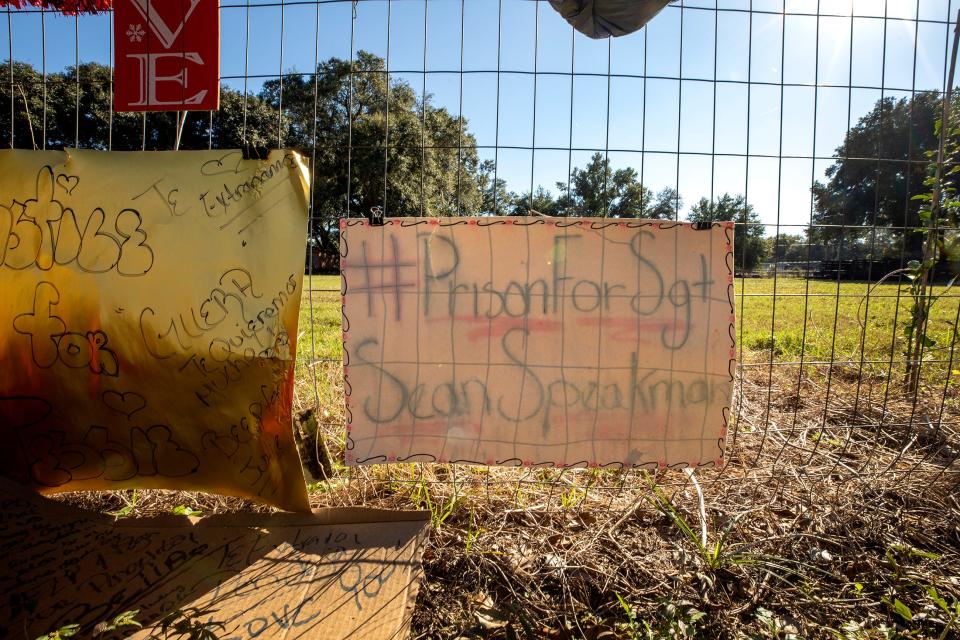Mental Health: Woman with mental illness wielding a shovel is killed by highly trained deputy

WAHNETA — Jessica Hernandez, 14, was off from school for Veteran’s Day, sitting at her kitchen table on a rainy afternoon in Wahneta when she heard a man yelling “Stop! Stop! Stop!” and then heard “three or four” gunshots.
When Hernandez looked out the window, she saw a woman now identified as 24-year-old Jessiram Hweih Rivera lying on the ground and Polk County Sheriff Sgt. Sean Speakman running to his car to retrieve a medical aid kit. Deputies Hannah Ferguson and Daniel Villagran arrived as Speakman was running back down the small dirt driveway off of Rifle Range Road to try to save the woman he had just shot.
Hernandez picked up her cellphone and videotaped a few seconds of Ferguson doing chest compressions on Rivera as Villagran sat ready to give mouth to mouth and Speakman called for paramedics and an ambulance. A shovel is seen lying at Rivera’s feet.
Stories in series: Mental health in Polk County and Florida: Read every story in our series

In just a few moments that afternoon, everything Speakman was trained to do to help mentally ill people throughout his 17-year law enforcement career collided with a woman whose family says — and documents show — has sought out, but also walked away from, help for a “history of bipolar disorder, depression, anxiety, and drug abuse” following the death of her father in 2011. She also had at least one suicide attempt.
While Rivera’s family and some in the public arena are demanding to know why Speakman didn’t use his taser or why he shot her, law enforcement experts are saying Speakman did what he was trained to do — which includes protecting himself.
The Ledger has reviewed dozens of court documents related to Rivera, along with Speakman’s personnel file, which is about 600 pages long. The documents show two very different people — a woman who grabbed a knife and cut her mother during a heated argument and a law enforcement officer who has commendations for saving lives, including people contemplating suicide.
Jessiram Hweih Rivera

Rivera was born June 11, 1997. In 2011, when she was 14 years old, her father was killed and that’s when her mother, Jessica Hweih, says her daughter began hanging out with the wrong people.
Two years later, at 16, she was charged in Osceola County with felony aggravated assault with a deadly weapon. Court records show that the case was labeled “no disposition specified.” In other words, it was dropped.
In 2015, court documents show that Rivera, then 18, had an ex-boyfriend, a baby, and a temper.
On Dec. 16, 2015, the Osceola County Sheriff’s Office responded to a domestic disturbance call. Rivera’s ex-boyfriend stated that the couple had gotten into an argument at 2 a.m. when he returned to his home. As he was holding their daughter, Rivera hit him with an open hand, angry that he was seeing someone else. She told officers she was angry that he was out late every night and not spending time with their daughter. When Rivera tried to leave, her car got stuck and, when she put it in reverse, she backed into him, although he wasn’t sure if she knew he was behind her car. He was not hurt. The ex-boyfriend called police at 8:30 p.m. the next evening and Rivera was charged with simple battery.
More: Mental Health: Law enforcement officers are Baker Acting people at alarming rates
In 2016, Rivera got into an argument with her mother, who repeatedly slapped Rivera “to get her to stop acting ‘out of control,’” according to a police report. Rivera ran past the front door and into the kitchen, where she grabbed a knife. Her mother ran after her and tried to get the knife.
“While she was trying to get the knife away from Jessiram, she was cut by her on the arm,” the affidavit reads. “Shortly after getting cut, the knife was removed from Jessiram’s hands and Jessiram was escorted out of the house to prevent them from fighting any further.”
Both women were arrested and Rivera’s young daughter was left with her stepfather, who had broken up the fight between the two women. Rivera’s charge of aggravated battery with a deadly weapon was dropped by the state.
In 2017, Rivera petitioned the court in Osceola County for child support from her ex-boyfriend. That case continued in court until two months ago, when he was ordered to pay Rivera.
That year, she was also charged by Kissimmee Police with felony battery on a law enforcement officer, for which she was convicted.
Suicide attempt

In February 2018, she was charged with felony possession of cocaine and eventually convicted.
The next month, Rivera’s mother called 911 to report that Rivera had tried to commit suicide.
A Winter Haven Police Officer arrived at the Haines Boulevard home at 4:20 a.m., where Hweih was waiting after Rivera texted her aunt and said she “had drank a whole bottle of pills to go to sleep and said goodbye.” The officer found Rivera in bed and unresponsive. She did have a pulse and was breathing. The officer found a half empty bottle of EZ-Nite Sleep Aid, an empty bottle of hydrocodone, an opioid painkiller, that had 20 pills a few days before, and an empty bottle of Cephalexin, an antibiotic.
“In my professional opinion, without proper treatment or care of a treatment facility, Jessarim was likely to cause harm to herself or others,” the officer wrote. The officer Baker Acted Rivera. A week later, the officer returned to the home to check on Rivera, per Crisis Intervention Training.
The mother told the officer that “her daughter has been doing better since she was released from the hospital. She is on four different kinds of medication and Jessica has been helping to make sure she takes them.”
In addition to the officer checking on Rivera, the hospital also called every few days, the mom told the officer.
“Jessiram was laying down at the time,” the officer wrote. “She didn’t really want to talk, but simply advised she was fine.”
She was found guilty on the cocaine charge and in September 2018 violated her parole and rearrested. She was let out on conditional release. In 2018 and 2019, she was charged with violating probation in both Orange and Osceola counties and rearrested.
Rehabilitation
Her mother said Rivera went through several rounds of rehab to try to kick her drug habit.
Hweih, who is a native of Puerto Rico, said that one out-patient facility in Kissimmee discontinued treatment because Rivera missed three appointments, a policy she found infuriating because the mentally ill don’t think or act like people in the general public.
“One day, maybe she was depressed but she don't wanna talk to nobody or the other day, maybe she was sleeping until it was late or it was days she forget about it,” Hweih said. “So she started missing appointments because sometimes she stayed up all night and then she didn’t wake up or she forgets, she was not in the mood because her mood swings. So now you have to look for another place for treatment all over again.”
More: Mental Health: Law enforcement officers are Baker Acting people at alarming rates
More: Mental Health: Polk Vision report shows homeless are most vulnerable population
In December 2019, Rivera walked away from a rehab facility in Avon Park.
"She walked out and she got to Wahneta and she hide in Wahneta with this guy for over two months - hide, completely hide,” Hweih said. “And me and my husband and my kids, we used to go here 2, 3, 4 o'clock in the morning. I went there with the sheriff three times ... I went with the sheriff who said, ‘You need to leave. This place is bad.’ And I said I'm not leaving without my daughter and we found her and I took her with me.”
In May 2020, she had a new boyfriend.
That month, Rivera called her mother crying and asking the woman to come pick her up “because her boyfriend was hitting her.” Polk County Sheriff’s Deputies arrived at the Dollar General on 3rd Street E in Winter Haven, but couldn’t find her. They called the boyfriend, who asked deputies to come to his automotive shop and talk to him. He said he and Rivera had gotten into an altercation and he asked her to leave. On May 1, Rivera was declared a missing person, but the next day she was found at her home in Winter Haven.
Final boyfriend
Twenty-four days later, Rivera appears again in law enforcement reports, this time with her final boyfriend. The couple were both arrested on May 26, 2020, for possession of meth. A jail booking sheet shows she was held at Tri-County Human Health, a provider of mental health and drug rehabilitation in Polk County.
Rivera became enraged at her boyfriend six months later in November 2020. An arrest affidavit shows she pulled a knife on him because he wouldn’t marry her.
“He stated she said she would cut him, cut his throat, and his family if they called law enforcement,” the affidavit states. “He stated he became afraid she would harm his parents and called law enforcement. He believed Rivera was seeing things because she began accusing him of injecting heroin into himself. He advised he has never used heroin.”
The altercation happened in the boyfriend’s parents’ home. His mother told the responding deputy that she also thought “Rivera was seeing things and observed that Rivera had not eaten much in the days she had been with them.”
Rivera’s mother described her to Ledger reporters as schizophrenic, which involves visual and/or auditory hallucinations.
Rivera was charged with felony aggravated assault with a deadly weapon, but the State Attorney’s Office dropped the charges because the boyfriend would not cooperate with the prosecution.
In February 2021, Hweih said her daughter posted on Facebook that she had been raped by one of her boyfriend’s friends when she was passed out. Her boyfriend told her later what had happened to her.
“And he didn't do anything” to stop it, her mother said about the boyfriend. “He told the story what they did to her and she was so hurt and she posted on Facebook.”
Hweih said in April or May, she got her daughter an apartment in Haines City, away from the boyfriend’s bad influence. She said Rivera was four or five months pregnant when she set her up in a studio rental, furnished it and filled the refrigerator with food.
“I said listen I’m going to get an apartment for you and because you don't want to live with me, you know, because (of) the rules and stuff, but I want her close to me, so I can monitor,” Hweih said, adding that her daughter was basically homeless before that point. “She got so happy in that little studio and she was, you know, doing well with this there every day.”

And then Hweih said Rivera’s boyfriend found her and started showing up at the apartment. The couple got into fights loud enough that law enforcement had to be called and the landlord told her she had to move out. Hweih told Rivera that her boyfriend was trying to make her homeless again and dependent on him.
At some point in 2021, Rivera’s mother said her daughter was turned away from a drug rehabilitation facility in Avon Park “because she was pregnant.” But she did not provide records to The Ledger to prove that.
On Sept. 9, 2021, Rivera gave birth to another daughter. Hweih said she saw bruises on her daughter when she would bring the baby over to visit.
But five weeks later, Rivera’s mother called the Department of Children and Families to have Rivera’s newborn daughter removed from her custody because of drug use.
“The referral suggested that the mother was unstable and the safety of the minor child was compromised,” a report provided by the Polk County Sheriff’s Office states. “Jessiram appeared to be stable and did not appear to be under the influence at the time of this investigation. She was drug-screened by the Investigator, which netted a positive result for MDMA (ecstasy), cannabis and amphetamines. Due to these results, a safety plan was put in place for the minor child, which places the minor child with the grandmother, Jessica.”
Rivera’s mother tried twice in the last month to place Rivera in a rehabilitation facility or the county jail for drug use under the state’s Marchman Act. The first attempt was on Nov. 4.
“I then transported (her) to Tri-County in Bartow, where she was turned over to staff with no issues,” a deputy wrote in a report. “I had no further involvement.”
But instead of getting the help she said she wanted earlier in the year and her mother so desperately wanted her to have, Polk County Sheriff Grady Judd said Rivera immediately checked herself out, which is allowable under the law.
On November 10, Rivera’s mother took out another Marchman Act on Rivera and asked that this time she be taken to the county jail so she could not leave. A warrant was issued for Rivera.
The next day, Rivera would encounter Polk County Sheriff Sgt. Sean Speakman.
Sgt. Sean Speakman
Speakman, 46, is a homegrown deputy – graduating from Kathleen Senior High in 1992 and Polk Community College in 1994. He worked as a computer network engineer in Tampa for several years before joining the Polk County Sheriff’s Office as a civilian in 1998 to work in its computer division.
Within months, he was receiving written compliments from his colleagues and supervisors, commending him for going “above and beyond” anything asked of him, helping co-workers with technical issues without them even asking. “Dedicated” and “professional” were also frequently sprinkled throughout his 600-page personnel file. He was named “Member of the Quarter” several times for his work, including creating a new way to format 50 new laptops, cutting the process from three hours each to just eight minutes per laptop.

Polk County Sheriff’s Office spokesman Scott Wilder said Speakman had “only two disciplines, but the originals have been purged per retention requirements.” One in 2001 required a letter of reprimand while another in 2006 involved verbal counseling. He has never been suspended and Wilder said Speakman has had no internal affairs investigations.
More: Mental Health: Polk Vision releases report ‘We have what it takes ... (to) change people’s lives’
More: Mental health: G. Pierce Wood closed in 2002 after deaths and mutilations. What went wrong?
In 2004, Speakman applied to become a deputy and began taking classes at Polk State College’s Law Enforcement Academy.
By 2006, he was assigned to the computer crimes unit, where he excelled in tracking down online pedophiles.
He gave a demonstration to a woman’s group, their husbands, and several teenagers in 2006. A letter from one of the members said the sheriff must “reap tons of accolades on Sean Speakman.”
“It was his first program and he was amazing,” one couple wrote in a letter to Judd. “He managed to hook a real live predator and it really blew people away...you should be sending him everywhere with that program.”
Bipolar teenager
That was also the year he went through Crisis Intervention Training and learned to handle mentally ill people who were having some kind of breakdown.
Within months, he was faced with 13-year-old Kyle Arthur, who is bipolar and was extremely depressed.
“Back then there were times where we didn’t know what to do,” Kyle’s mother, Diana Arthur, said. “It was hard to figure out. We were still learning about his bipolar diagnosis.”
“Bipolar disorder is a mental disorder that causes unusual shifts in mood, energy, activity levels, concentration, and the ability to carry out day-to-day tasks.” according to the National Institute of Mental Health.
Arthur described one night when Kyle spotted something in a television ad that he wanted. He would become obsessed over things and demand to be taken to the store then and there to get it.
"He got mad because I wouldn’t take him to WalMart - he grabbed a kitchen knife and locked himself in his bedroom,” Arthur said. “Then he came out with his big beautiful blue eyes and tears running down his face. He said, ‘Mom, you need to take me somewhere. I can’t keep doing this to you and dad. I need to live someplace else.”
She said 40 minutes later, she went into his room and he was playing Xbox live and seemed perfectly fine.
But one night, Kyle locked himself in his room and said he didn’t want to live any more.
Arthur and her husband called 911 and asked for a deputy with Crisis Intervention Training to come. Speakman showed up and began implementing what he had learned in the week-long classes. He first talked to the worried parents, asking what medication was Kyle taking. But the family was struggling to find the right one – a process that can take weeks or months.
Then Speakman asked if Kyle had any weapons with which he could hurt himself. They said they didn’t think so.
"Sean went to the door and he talked in a very calm voice,” Arthur said. “He said, ‘Hey Kyle, this is Deputy Speakman. Hey, I just want to talk to you. I’m not here to do anything. I just want to talk to you to see what’s going on.’”
On the other side of the door, Kyle started to climb out the window, but spotted deputies outside on the lawn.
“The next thing we knew, he opened his bedroom door and ran right past him and out the front door and down the street,” Arthur said. “So Sean took off after him and basically was able to catch up with him and put him in the patrol car and that’s where they decided, well, we’re going to Baker Act him.”
She said Speakman had to tackle Kyle to get him to stop, something they joked about the next day when Speakman returned to the house to check on Kyle. The young deputy also gave the teenager his cellphone number and told him to call any time if he needed something.
“And that shows you what a good person Sean is. There for awhile, Kyle, he actually contacted Sean a few times when he needed somebody to talk to or run something by him,” Arthur said. “At the time we used to say he’s like a mentor to my son.”
Kyle is now grown with a family of his own and will turn 30 just after Christmas.
Speakman rose through the ranks at the sheriff’s department, working in felony crimes – where he often had the most arrests in his unit – joining the SWAT team, and then becoming a sergeant in recent years. He also earned his master’s degree in cybersecurity and cyber-intelligence from the University of South Florida in 2019.
Medal of Honor

In 2013, Speakman received a Medal of Honor from Judd for a November 2012 incident with a Mulberry man threatening to kill himself and then firing on responding deputies.
Speakman was assigned to help evacuate the houses in the area, including those directly across from the gunman’s home.
“As you were performing your duties, suspect (redacted) began shooting his weapon at deputies,” Judd wrote in the commendation, noting that the man’s wife told the deputies that her husband was trying to kill them. “Despite the immediate life-threatening peril to yourself and peers, you continued to place yourself at risk to protect others...you encountered an elderly woman who was bed ridden and dependent on oxygen. Realizing her home was taking fire from the suspect, you selflessly carried her to an awaiting ambulance, placing yourself in even greater risk due to your inability to return fire while carrying her.”
Judd called Speakman’s effort that day “heroic” and “valiant” and awarded him the medal for his “steadfast determination to keep everyone at the scene safe.” None of the residents in the neighborhood were harmed.
“Sustained life”
In November 2015, Speakman’s supervisor, Jennifer Davis, commended him for utilizing his CPR training and saving someone’s life at a call on Country Club Lane.
“Your efforts and professionalism on the scene sustained life for the victim allowing for transport to (Lakeland Regional Health Medical Center) for additional medical support,” Davis wrote. “Though calls like this are considered ‘our job,’ they are certainly the calls that make a huge impact on public perception. I am grateful to have you as a member of SW ALPHA and a strong part of the professional image we display.”
Days later, a person handwrote a note thanking Speakman for his professionalism in another incident.
“The officer performed his duties with a compassion and empathy not usual by public servants,” the person wrote. “The officer acted very personable and warm. I wish to thank him personally.”
In June, he requested and was granted a transfer to the department’s southeast unit. That transfer put him in the path of Jessiram Hweih Rivera on Nov. 11.
A shovel and a gun
Rivera spent the last hour of her life that day walking in and out of busy traffic along Rifle Range Road near Redemption Baptist Church in Wahneta.
A recording of a 911 call provided to The Ledger shows that people called into the emergency center to report a woman in a blue top and flowered pants with blonde hair walking north on Rifle Range Road at 3:17 p.m.
Judd said a witness told investigators that Rivera said the police were after her and she was not going back to jail.
But the first responding deputy couldn’t find Rivera and cleared the scene a few minutes after arriving.
At 3:41 p.m. another call came in and Speakman, who was monitoring the department’s live 911, arrived within a minute and found Rivera walking down a long dirt driveway.
While Rivera was wanted on the Marchman Act, Speakman didn’t know who she was, or that she was wanted. He also didn’t know about her violent past, or her history of mental illness and drug addiction.
He saw a woman who was about 5’4 and weighed 115 pounds – down from 150 pounds the year before. He also saw that she was angry and carrying a shovel. Speakman is 5’10 and weighs about 175 pounds.
Judd said when Speakman approached Rivera, he tried to engage her in a conversation – a way to de-escalate, or calm, a tense situation and develop a quick relationship, per his CIT training. But Rivera did not want to talk. Instead, she raised the shovel over her head and slammed it onto a stack of wood alongside the driveway.
“Sergeant Speakman begins to approach her and try to calm her down 'cause he can see that she's agitated and angry and she turns and starts advancing on him,” Judd said, adding that Speakman continued to try to talk with Rivera. “She ignores it. She brings the shovel up over her head as she's advancing on him and he's now telling her to ‘Drop the shovel! Drop the shovel!’ and she's got it in a clubbing fashion over her head. She responds to him, ‘I'm not afraid of you,’ as she continues to advance on him.”
Judd said investigators talked to two independent witnesses who confirmed that she was holding the shovel over her head and that Speakman ordered her multiple times to put the shovel down as he drew his weapon and backed away from her.
Judd said Rivera got within striking distance of Speakman, who feared that she would stab him or slice him with the shovel’s straight blade or bash his head in with it.
And then Speakman had to make a split-second decision.
“After many opportunities to put the shovel down, she didn't – then he shot her,” Judd said. “As soon as she went down, he provided first aid for her and we called, obviously, EMS and Fire Rescue and they came.”
A mother's frustration
Last week in an interview with The Ledger, Rivera’s mother was angry, wanting to know why Speakman, a highly trained and decorated law enforcement officer, didn’t use his Taser and why he had to shoot her four times.
“OK, maybe you got, you got intimidated, maybe you thought your life is at risk,” Hweih said. “You should shoot her only once - she going down, that's it why four times?”
And then this woman, who tried so hard to pull her daughter away from drugs and a string of bad relationships, in her anguish blamed Speakman.
“You're not a rookie - I think the he wanted to kill her,” Hweih said. “The Polk Sheriff department (say), ‘If you don't listen to us, guess what? We shoot you.”
Judd said he understands Hweih’s grief and anger.
“Mother is going to defend that daughter ‘til the ends of the earth and I understand that,” Judd said. “We expect that. That’s what mothers do. That’s what she should do as a mother. We don’t expect her to look at this rationally and unemotionally.”
Judd explained that no law enforcement officer is trained to wound someone if the officer or deputy is in imminent danger of grave injury or death.
“One of the trainings says anytime someone with a knife exhibited that is as close as 21 feet to a law enforcement officer that can charge the officer and stab them before they can pull their gun out of a holster,” Judd said. “So, when someone is coming at you with a shovel that’s almost five feet long and they’re closing the gap, you don’t wait for them to swing at you with a shovel. My experience is deputies traditionally wait too long, rather than react, when they first legally could because they want to avoid using deadly protective action.”
Retired Police Maj. Sam Cochran, who taught Crisis Intervention Training at the University of Memphis, declined to speak specifically about the Speakman-Rivera shooting, but commented in general about dealing with violently mentally ill people.
“Training is specifically to de-escalate, but sometimes the individual is so sick and so out of control the de-escalation part doesn’t work,” Cochran said. “You wish you had some magic formula for every situation, but you don’t.”
Risdon Slate, who teaches criminology at Florida Southern College, said public outcry could be quelled if Speakman had been wearing a body camera.
“Without video or reliable witnesses, it is difficult to assess police encounters with the citizenry or even violent contact between civilians in retrospect,” Slate said.
Judd continues to be adamantly against equipping his deputies or patrol cars with cameras.
In an interview with reporters last week, Judd said, "People have a constitutional right to privacy. I am not going to ask the taxpayers to spend four million-plus dollars per year for us to wear a camera and point at them. They've all got cameras they can point at us and it doesn't cost the taxpayer one penny."
Slate added that officer training is vital, particularly Crisis Intervention Training so law enforcement can learn de-escalation techniques to calm a person and avoid physical or lethal altercations.
“CIT training is first and foremost about officer safety,” Slate said in an email. “For a crisis situation to be resolved successfully the officer(s) needs to stay alive.”
Judd continues to place the blame for Rivera’s death at Rivera’s feet.
“It all comes down to this – why are you trying to commit a deadly attack on a police officer?” Judd said. “If you don’t attack a police officer with deadly or potentially deadly force, you will never, never, never be shot. I’m not talking about a law enforcement officer that’s operating outside the boundaries of the law.”
"I'm making justice for my daughter."

Balloons, solar-powered lights, and flowers now mark the spot in Wahneta where Rivera died. Her family has left notes on cardboard to Rivera. One sign calls for Speakman to go to prison.
Her mother took Rivera's to Puerto Rico last week for burial next to Rivera's father. Hweih said she will fight to make sure nothing like this happens to anyone else's daughter.
"They must stop," Hweih said. "Because I'm not stopping. I'm making justice for my daughter. I'm going to do all my power to make this national, worldwide."
To get help
Polk County’s Peace River Center offers a 24-Hour Emotional Support and Crisis Line: 863-519-3744 or toll-free at 800-627-5906.
Ledger reporter Rebecca Lee contributed to this story.
Ledger reporter Kimberly C. Moore can be reached at kmoore@theledger.com or 863-802-7514. Follow her on Twitter at @KMooreTheLedger.
This article originally appeared on The Ledger: Mental Health: Woman with mental illness wielding shovel killed by highly trained deputy

